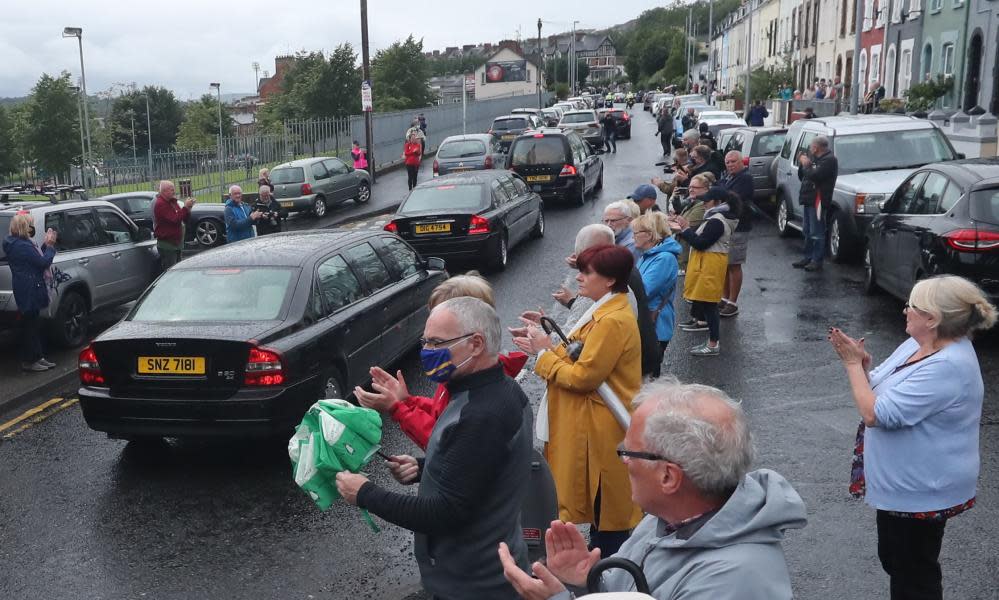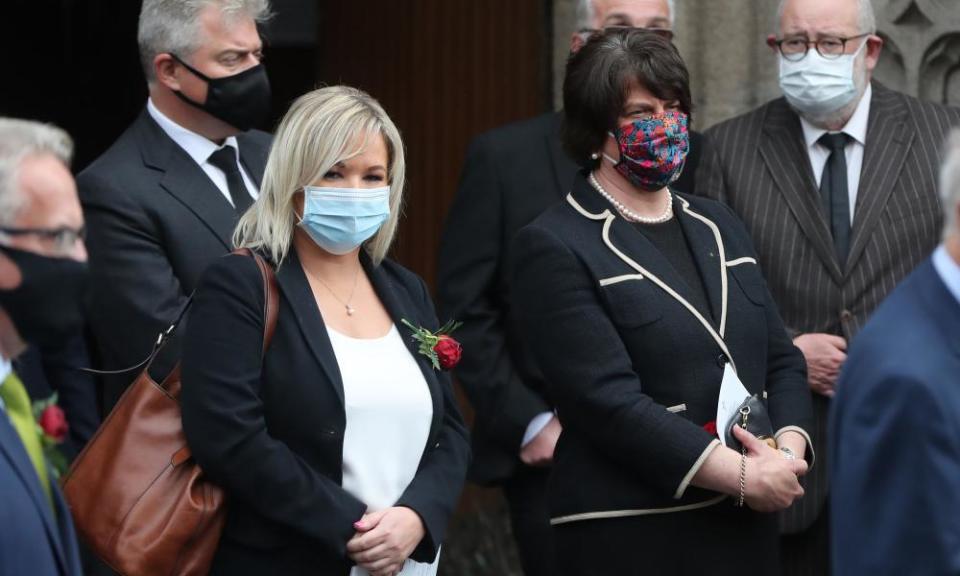John Hume's funeral in Derry unites mourners in sombre farewell

John Hume spent a lifetime drawing the island of Ireland together and his funeral proved no different, uniting mourners in a sombre farewell to a political titan.
Unionist and nationalist leaders joined family and friends at St Eugene’s Cathedral in Derry on Wednesday to celebrate the life and grieve the loss of a man many consider the greatest person in Irish history.
Social distancing rules capped the numbers inside at 120 and Hume’s family had urged people to follow the ceremony on TV rather than congregate outside the gates, lending a subdued air to a city speckled with drizzle.
But there was no mistaking the pride in the local son who engineered peace in Northern Ireland, prompting tributes across the island and messages from the pope, the Dalai Lama, Downing Street, the White House and Bill Clinton.
The Nobel laureate – a prize he shared with the Ulster Unionist leader David Trimble – died on Monday aged 83 after a long struggle with dementia.
“Today we truly give thanks to God for the gift of John Hume,” Fr Paul Farren told the congregation. “Because make no mistake about it, there are people alive today who would not be alive had it not been for John’s vision and his work.”
The late leader of the Social Democratic and Labour party (SDLP) has become a secular saint but the priest reminded mourners and viewers that Hume waged an often lonely struggle to coax the IRA and Sinn Féin into negotiations, to bring unionists and British and Irish governments onboard and to orchestrate the 1998 Good Friday agreement.

“We should never underestimate how difficult it was for John to cross the road and do what was intensely unpopular for the greater good … even in the darkest moments, when people would have been forgiven for having no hope, John made peace visible for others,” Farren said. He also lauded Hume’s widow, Pat, for her behind-the-scenes contribution.
Mourners included Arlene Foster, Northern Ireland’s first minister and Democratic Unionist party leader, and Michelle O’Neill, the deputy first minister and deputy leader of Sinn Féin, who run the Stormont executive, a legacy of Hume’s work. From Dublin came President Michael D Higgins, the taoiseach, Micheál Martin, and other dignitaries.
The Dalai Lama’s message praised Hume’s persistence. “His message about peace and nonviolence in the resolution of conflict, no matter how protracted or difficult it may seem to be, will long survive him.” Bono, U2’s lead singer, also paid tribute. “We were looking for a great leader and found a great servant.”
As a young schoolteacher, Hume led civil rights protests in Derry in the late 1960s demanding an end to discrimination against Catholics. After the Troubles erupted he co-founded the SDLP, became an MP and MEP, and spent three decades arguing for an “agreed Ireland” shared peacefully by unionists and nationalists. He enlisted support from successive administrations in Dublin, London, Brussels and Washington.
Viewers in a 2010 RTÉ poll voted Hume the greatest person in Irish history.
On Tuesday night candles in windows and doors lit a path for the funeral cortege as it wound to the cathedral. Boris Johnson tweeted that a candle was lit in Downing Street. Suspected republican dissidents in Derry hijacked and burned several vehicles – a reminder that fringe groups still espouse violence.
In a eulogy at the funeral, John Hume Jr paid tribute to his father’s quest for peace and made light of his driven, round-the-clock lifestyle, saying he kept the Irish chocolate industry in healthy profits for many years.
“Yorkies, Crunchies, Creme Eggs, Double Deckers, Wispas – you name it, he loved them all,” he said. “We often found it odd how a man with the intelligence to win a Nobel prize could seriously believe that Crunchies were less fattening because they are full of air.”
At the end of the ceremony the singer Phil Coulter performed The Town I Loved So Well.
By the time the wicker coffin emerged from the cathedral to be taken to the cemetery, drizzle had given way to sunshine. Several hundred people lined the streets. “It’s sad to lose him,” said Anna Peake, 79. “He was an amazing man for peace and love on the island of Ireland. The people of Derry loved him.”


